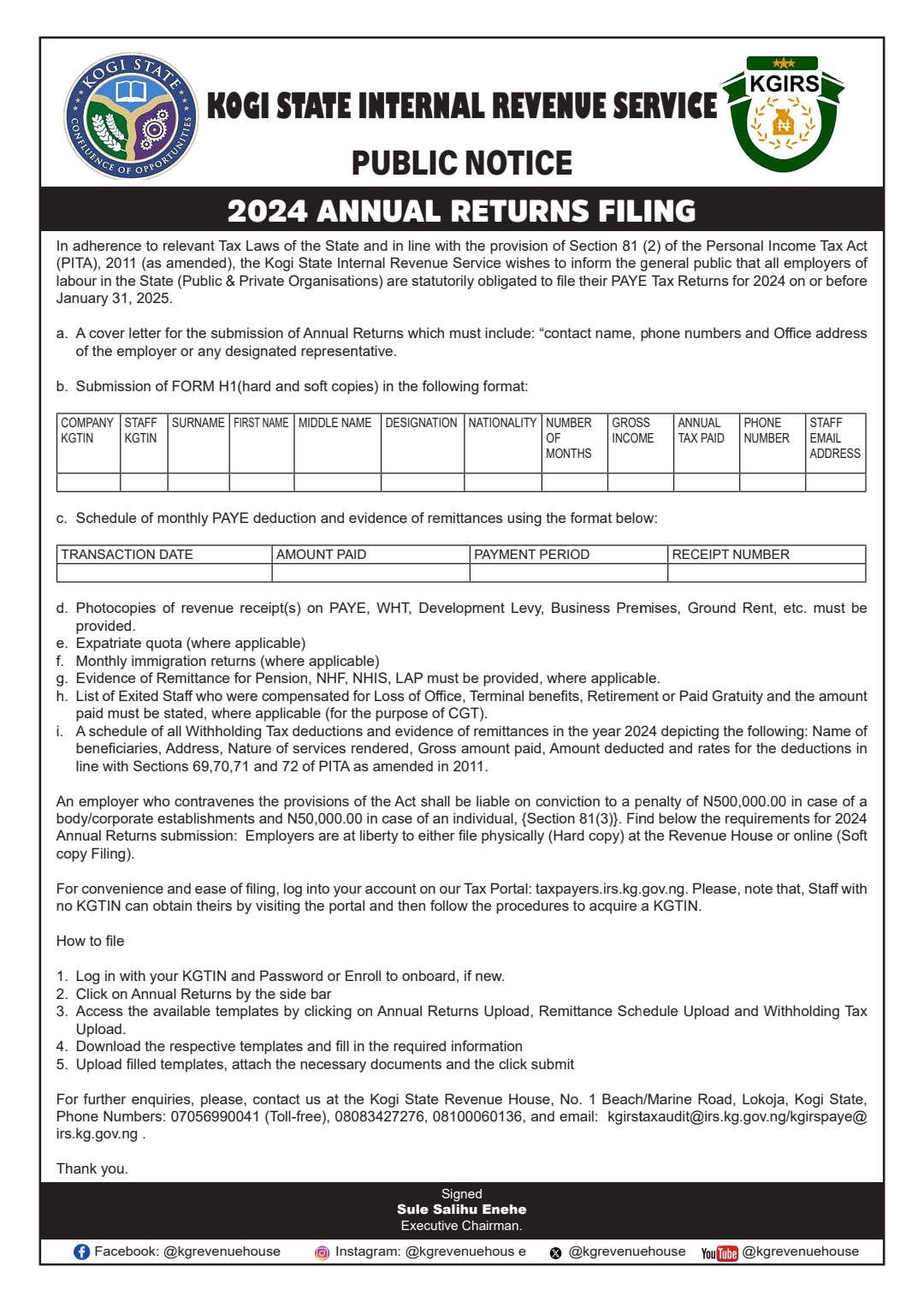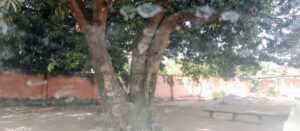

By Dada Ahmed.

Amid the characteristic scorching heatwave which comes between January, February and March or upto April every year, blanketing Lokoja, the capital of Kogi State, North Central Nigeria,residents have found refuge in the few patches of shade offered by trees, desperately seeking relief from the relentless sun. The air is heavy with a simmering warmth, as people sit in groups under tree canopies, exchanging stories of how the heat has affected Lokoja ,the town notorious for excessive heat,compared to some other states in Nigeria.
On a recent visit to various areas of Lokoja, particularly Post office area,our correspondent witnessed the daily struggle of residents coping with the unyielding heatwave. Many could be seen sitting in the shade, drenched in sweat, their faces reflecting the strain of enduring the extreme temperatures. The town, which sits at the confluence of the Niger and Benue Rivers, a geographical landmark that once marked the lifeblood of trade, is now bearing the brunt of a harsh climate, and its residents are paying the price.
Lokoja’s strategic location at the crossroads of northern, southern, eastern, and western Nigeria places it at the heart of the country’s economic and transportation networks. Yet, the very factors that once made the city a thriving center of commerce have now contributed to its vulnerability to extreme weather.
Situated at approximately 7.8°N latitude and 6.7°E longitude, the lokoja’s geographical positioning makes it susceptible to the rising temperatures that have gripped much of the country at this moment of the year,March Precisely.
According to environmental experts, Lokoja’s current heatwave is not just a passing inconvenience but an exacerbation of pre-existing challenges faced by its residents. Health professionals have raised alarms over the increase in heat-related health issues, such as dehydration, heat stroke, and exhaustion. Hospitals in the area have reported a surge in patients with symptoms of heat exhaustion, further stretching the already limited healthcare resources.
“Every day, we see more patients coming in with heat-related conditions,” “It’s clear that the extreme temperatures are taking a toll on people’s health. We’re doing our best with what we have, but the situation is growing increasingly dire”,said Dr. Bello, a physician at one of private hospitals in Lokoja.
Health Experts Warn of Heat-Related Illnesses, Offer Solutions for Prevention and Management
They identify some heat related illnesses to include;heat exhaustion, heat exhaustion,heat stroke,heat cramps,heat rash,heat syncope,heat syncope.and dehydration among others.
As temperatures soar, health experts are urging the public to take extra precautions against heat-related illnesses, which occur when the body is exposed to extreme heat for prolonged periods. Prolonged exposure to high temperatures can lead to various health problems, including heat exhaustion, heat stroke, heat cramps, heat rash, heat syncope, and dehydration.
To prevent these potentially dangerous conditions, experts stress the importance of staying hydrated by drinking plenty of water throughout the day, particularly in hot weather. They also recommend avoiding alcohol and caffeinated beverages, which can contribute to dehydration. Sports drinks containing electrolytes are also advised, as they help replenish salts lost through sweating.
They called for wearing lightweight, light-colored clothing made from breathable fabrics, such as cotton, can help your body stay cool.
Lighter colors reflect sunlight, while darker colors tend to absorb more heat, further increasing the risk of heat stress,they added.
In addition to appropriate clothing, experts recommend seeking shade and staying indoors during the hottest part of the day, usually between 10 a.m. and 4 p.m. If going outside is unavoidable, they advise finding shaded areas to rest and cool off periodically.
Cooling products like cooling vests, damp cloths, and fans or air conditioning can also help lower the body’s temperature.
They explained that taking cool showers or baths is another quick way to bring your body temperature down.
Reducing strenuous activities, particularly during peak heat, is another key solution. Experts recommend exercising or working outside during cooler times of the day, such as early morning or evening.
When it comes to food, experts caution against heavy meals, adding that such development can increase body heat. Instead, they recommend opting for lighter, cooler meals that don’t require as much digestion, which can help prevent overheating.
Air circulation through fans or air conditioning can also make a significant difference, improving indoor comfort by reducing indoor temperatures.
Finally, health professionals stress the importance of recognizing and treating heat-related illnesses early. The early signs of heat exhaustion include dizziness, excessive sweating, and nausea. If these symptoms occur, experts advise moving to a cool place, hydrating, and resting to avoid more severe conditions like heat stroke.
By following these simple yet effective recommendations, the health professionals expressed confidence in the ability of the people to reduce the risk of heat-related illnesses and manage the impacts of high temperatures with greater ease and safety.
But the physical toll is only part of the story. The economic repercussions of this heatwave are becoming more apparent with each passing day. Many low-income earners in Lokoja, confirmed that the heat has disrupted their livelihoods in profound ways. Street vendors, market sellers, and small-scale traders who depend on outdoor sales are not speared as the have been forced to adjust their working hours. Many choose to close up shop during the hottest parts of the day, while others are left with no choice but to cease operations altogether.
“I can’t stay out in this heat all day anymore . It’s just too hot. I’ve had to reduce my hours because it’s unbearable. I used to make enough to feed my family, but now it’s barely enough to get by,” Amina Mohammed, a local market vendor at the old market in Lokoja relates her experience.
Amina is not alone in this frightening weather development as farmers in the area are also feeling the heat. They regret that the intense temperatures have made it difficult for them to care for their crops and According to them, crops that once thrived in Lokoja’s fertile soil are now struggling to survive in the harsh conditions. Experts fear that the ongoing climate shifts could lead to higher food prices, exacerbating the financial burden on already struggling households.
“The heat is making it nearly impossible to farm properly. “The crops need water, and we’re not getting enough rain. If this continues, we will have less food to sell, and the prices will go up. It’s a tough time for us,”said Yusuf Tanimu, a local farmer at Sarki noma.
Beyond the physical and economic impacts, the current heatwave is also said to be straining the social fabric of Lokoja. Public spaces, once bustling with activity, are now less crowded, as people seek to avoid the oppressive heat. Community engagement has decreased, with many choosing to stay indoors rather than partake in social activities. The heat has sown frustration and anxiety, as families struggle to meet basic needs in an environment that grows increasingly hostile.
“People are frustrated. “We’re used to some heat, but this is unbearable. It’s affecting everything—our health, our jobs, and our ability to connect with others. It’s taking a toll on all of us,”said Grace Nwachukwu,a resident of Lokoja.
Keen watchers of weather in Lokoja agree that the ongoing heatwave in the area,thoug not news,is more than just an inconvenience, adding that it is a multifaceted crisis that affects every aspect of life for the residents.
From health to economy to social life, the effects of the heat are undeniable. If this extreme weather continues, the consequences for Lokoja could be far-reaching, with long-term impacts on its residents’ livelihoods and overall well-being, if nothing is done to check the development.
As the heatwave rages on, Lokoja’s residents said that they are left to grapple with an environment that seems to be growing more inhospitable by the day. How long they can endure these conditions remains uncertain, but one thing is clear,the heatwave is reshaping their lives in ways that may take years to fully comprehend.
A stitch in time saves nine, according to the popular adage
The importance of ensuring precautionary measures by residents and the state government cannot be overemphasized to avert heat related health challenges.
The electricity supply must be improved on to energise cooling systems such as fans and air conditioners,same for potable water to ease the effects of heatwave hitting n homes and public places in Lokoja and its environs.
A stitch in time saves nine, according to the popular adage.
Ahmed publishes The Reporters.

